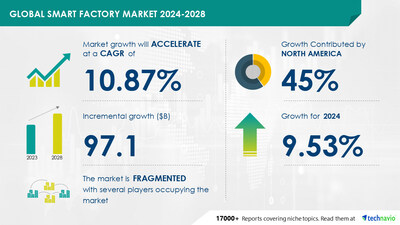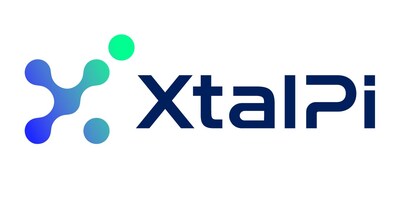Smart Factory Market size is set to grow by USD 97.1 billion from 2024-2028, Increasing focus of vendors on setting up new smart factories to boost the market growth, Technavio
Press Releases
Jul 04, 2024
NEW YORK, July 4, 2024 /PRNewswire/ — The global smart factory market size is estimated to grow by USD 97.1 billion from 2024-2028, according to Technavio. The market is estimated to grow at a CAGR of 10.87% during the forecast period. Increasing focus of vendors on setting up new smart factories is driving market growth, with a trend towards emergence of industrial internet of things (IIoT). However, data privacy and security concerns poses a challenge. Key market players include ABB Ltd., Azbil Corp., Cisco Systems Inc., Dassault Systemes SE, Emerson Electric Co., Endress Hauser Group Services AG, FANUC Corp., FUJI Corp., General Electric Co., Honeywell International Inc., Johnson Controls International Plc., Microsoft Corp., Mitsubishi Electric Corp., Oracle Corp., Robert Bosch GmbH, Rockwell Automation Inc., SAP SE, Schneider Electric SE, Siemens AG, and Yokogawa Electric Corp..
Get a detailed analysis on regions, market segments, customer landscape, and companies – Click for the snapshot of this report
|
Forecast period |
2024-2028 |
|
Base Year |
2023 |
|
Historic Data |
2018 – 2022 |
|
Segment Covered |
Component (Industrial sensors, Industrial robots, Industrial 3D printers, and Machine vision systems), Solution (SCADA, MES, DCM, PLC, and PLM), and Geography (North America, Europe, APAC, South America, and Middle East and Africa) |
|
Region Covered |
North America, Europe, APAC, South America, and Middle East and Africa |
|
Key companies profiled |
ABB Ltd., Azbil Corp., Cisco Systems Inc., Dassault Systemes SE, Emerson Electric Co., Endress Hauser Group Services AG, FANUC Corp., FUJI Corp., General Electric Co., Honeywell International Inc., Johnson Controls International Plc., Microsoft Corp., Mitsubishi Electric Corp., Oracle Corp., Robert Bosch GmbH, Rockwell Automation Inc., SAP SE, Schneider Electric SE, Siemens AG, and Yokogawa Electric Corp. |
Key Market Trends Fueling Growth
The Industrial Internet of Things (IIoT) and technological advancements are driving the adoption of smart machines in industries and services sectors. The increasing use of smart devices, wireless technology, and cloud services will expand the utility and flexibility of smart machines. Vendors offer remote services and control modules through Wi-Fi technology, enabling human operators to manage multiple machines at once. IIoT integrates various smart machines to help companies meet strategic goals and key performance indicators (KPIs). The forecast period will see an increase in IIoT adoption for creating connected and synchronized factories. To meet the evolving needs of smart factories, equipment must be adjustable, and robots must be highly flexible. Vendors are improving user interfaces to make smart machine operation accessible to non-technical staff. IIoT’s growth will benefit vendors in the smart machines market, with demand for expert systems, autonomous robots, and other smart machines. These factors are expected to fuel the growth of the smart machines market during the forecast period.
In today’s business world, Smart Factories are trending due to their ability to increase speed and quality in manufacturing processes. These factories prioritize workplace safety, optimize floor space utilization, and integrate navigation systems with mobile robots. The plastic and wood industries are embracing this technological trend, using real-time scenario data from compatible devices like smartphones and HMIs. Engineers utilize physics-based modeling for improved employee productivity, capturing data in real-time through sensors like level, temperature, flow, pressure, force, image, and gas sensors. Decision-making is enhanced through real-time analysis, while organizational design and distribution, strategic, and commercial activities are streamlined. Energy efficiency and product quality are key benefits, along with risk mitigation, cost savings, and asset utilization. The process industry segment, including oil & gas, is a significant adopter, focusing on energy efficiency and offshore regions. IoT devices play a crucial role in Smart Factory operations, enabling uninterrupted production and reducing unplanned downtime.
Research report provides comprehensive data on impact of trend. For more details- Download a Sample Report
Market Challenges
- Smart factories are revolutionizing industrial processes with automation and data-driven decision making. However, the increasing use of connected devices and web-based communication in industrial settings also exposes these systems to cyberattacks. In the oil and gas industry, data breaches can disrupt operations and lead to financial or intellectual losses. In the power industry, the adoption of smart grids and SCADA systems increases vulnerability to cyberattacks, which can compromise sensitive data and disrupt network operations. Vendors offer anti-malware solutions, but hackers continue to find new ways to bypass security. A single compromised system in a network can bring down the entire system, posing significant risks to data centers and industrial networks. The evolving nature of cyberattacks poses a significant challenge to the growth of the smart factory market.
- In today’s business landscape, the Smart Factory Market is facing several challenges. The integration of smart field devices and industrial robots requires reliable communication technologies like 5G and IoT for seamless data exchange. Cyberattacks pose a significant threat to networked devices, including sensors in the Metal & Mining industry. Augmented and virtual reality, machine learning, and artificial intelligence are transforming manufacturing methods, but ensuring safety and quality control in real-time data is crucial. 5G technology and cellular connections offer reliable and robust wired connectivity for high-speed manufacturing, reducing downtime. Self-optimizing equipment and machine learning improve plant efficiency and consistency. However, organizations must address new requests for data insights and issue resolution, ensuring on-time delivery and product improvement. Covid-19 pandemic and lockdown orders have disrupted production activities, making it essential to adapt to Industry 4.0 and Smart Manufacturing Technology. Industrial robot usage in sectors like Aerospace & Defense and 3D printing segments is increasing, requiring consistent and efficient production systems. Ensuring data security and privacy is vital as more gadgets and production systems become interconnected.
For more insights on driver and challenges – Download a Sample Report
Segment Overview
This smart factory market report extensively covers market segmentation by
- Component
- 1.1 Industrial sensors
- 1.2 Industrial robots
- 1.3 Industrial 3D printers
- 1.4 Machine vision systems
- Solution
- 2.1 SCADA
- 2.2 MES
- 2.3 DCM
- 2.4 PLC
- 2.5 PLM
- Geography
- 3.1 North America
- 3.2 Europe
- 3.3 APAC
- 3.4 South America
- 3.5 Middle East and Africa
1.1 Industrial sensors- The Smart Factory market refers to the implementation of advanced technologies, such as automation, robotics, and IoT, in manufacturing processes. This results in increased efficiency, productivity, and quality. Companies invest in Smart Factories to reduce costs, improve competitiveness, and meet customer demands. The market is expected to grow significantly due to the ongoing digital transformation in industries. Smart Factories enable real-time monitoring and data analysis, leading to better decision-making and optimized operations.
For more information on market segmentation with geographical analysis including forecast (2024-2028) and historic data (2018 – 2022) – Download a Sample Report
Research Analysis
Smart factories are transforming traditional manufacturing processes by integrating advanced technologies such as deep learning, computer vision, context awareness, big data, SCADA systems, Industrial IoT (IIoT), and data analysis. These technologies enable real-time data collection and analysis, leading to improved efficiency, productivity, and quality. The cloud, capital investments in IT infrastructure, software, advanced machinery, industrial robots, communication technologies, and 5G technology are essential components of smart factories. Sensors, cyberattacks, and industrial sensors are critical concerns in this domain. The Metal & Mining industry and Information Technology industry are major adopters of smart factories, with applications ranging from predictive maintenance to augmented reality and virtual reality. The integration of these technologies requires careful planning and collaboration between IT and operational technology teams.
Market Research Overview
Smart factories are transforming traditional manufacturing processes by integrating advanced technologies such as Artificial Intelligence (AI), Deep Learning, Computer Vision, Context Awareness, Big Data, and SCADA systems. Industrial IoT (IIoT) and IT infrastructure play a crucial role in data collection and analysis. Real-time data enables self-optimizing equipment, improving plant efficiency, safety, and quality control. Smart field devices, industrial robots, communication technologies, and 5G technology are key components of smart factories. Sensors and cyberattacks are significant challenges that need to be addressed. Various industries, including Metal & Mining, Aerospace & Defense, Plastic, and Wood, are adopting smart manufacturing technology. Augmented Reality (AR) and Virtual Reality (VR) enhance manufacturing methods, providing new requests for data insights, issue resolution, and on-time delivery. Real-time data exchange and reliable connections are essential for high-speed manufacturing and reducing downtime. The technological trend towards Industry 4.0 and smart manufacturing technology is accelerating, with 5G networks and IoT playing a significant role. The Covid-19 pandemic and lockdown orders have increased the adoption of smart manufacturing technology to maintain production activities. Smart manufacturing technology offers numerous benefits, including consistency, speed, quality, workplace safety, floor space utilization, and navigation systems using mobile robots. Engineers use physics-based modeling and HMI to improve employee productivity and data capture, transmission, and real-time analysis. Compatible devices like smartphones and smart eyewear are also being used in smart factories.
Table of Contents:
1 Executive Summary
2 Market Landscape
3 Market Sizing
4 Historic Market Size
5 Five Forces Analysis
6 Market Segmentation
- Component
- Industrial Sensors
- Industrial Robots
- Industrial 3D Printers
- Machine Vision Systems
- Solution
- SCADA
- MES
- DCM
- PLC
- PLM
- Geography
- North America
- Europe
- APAC
- South America
- Middle East And Africa
7 Customer Landscape
8 Geographic Landscape
9 Drivers, Challenges, and Trends
10 Company Landscape
11 Company Analysis
12 Appendix
About Technavio
Technavio is a leading global technology research and advisory company. Their research and analysis focuses on emerging market trends and provides actionable insights to help businesses identify market opportunities and develop effective strategies to optimize their market positions.
With over 500 specialized analysts, Technavio’s report library consists of more than 17,000 reports and counting, covering 800 technologies, spanning across 50 countries. Their client base consists of enterprises of all sizes, including more than 100 Fortune 500 companies. This growing client base relies on Technavio’s comprehensive coverage, extensive research, and actionable market insights to identify opportunities in existing and potential markets and assess their competitive positions within changing market scenarios.
Contacts
Technavio Research
Jesse Maida
Media & Marketing Executive
US: +1 844 364 1100
UK: +44 203 893 3200
Email: [email protected]
Website: www.technavio.com/
![]() View original content to download multimedia:https://www.prnewswire.com/news-releases/smart-factory-market-size-is-set-to-grow-by-usd-97-1-billion-from-2024-2028–increasing-focus-of-vendors-on-setting-up-new-smart-factories-to-boost-the-market-growth-technavio-302188941.html
View original content to download multimedia:https://www.prnewswire.com/news-releases/smart-factory-market-size-is-set-to-grow-by-usd-97-1-billion-from-2024-2028–increasing-focus-of-vendors-on-setting-up-new-smart-factories-to-boost-the-market-growth-technavio-302188941.html
SOURCE Technavio





